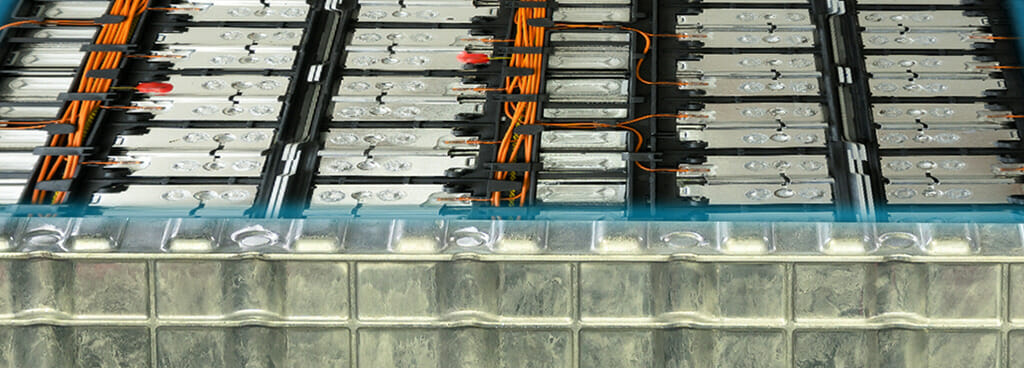- Home
- Services/IndustriesServicesindustries
- About Us
- LocationsStatesAccordion ContentAccordion ContentAccordion ContentAccordion Content
- Job Openings
- Quick Links
- ATS Family

Mechanical Testing EV Batteries
As the automotive industry reaches the critical juncture between pursuing gas-powered or electric vehicle (EV) production, ATS supports manufacturers with mechanical testing for EV batteries with our reliable and qualified lab. Our A2LA-accredited lab helps engineers anticipate an EV battery’s response to normal operating conditions, such as vibration and force.
Before releasing a battery for mass production and distribution, EV battery manufacturers and engineers may request mechanical tests as part of larger business processes:
- Quality assurance
- Safety testing
- Standard and regulation compliance
Mechanical Testing
ATS uses mechanical testing to determine an EV battery’s properties and assess functionality. We deliver precise measurements and thorough analysis using powerful technology and experts with decades of experience. We follow OEM instructions when planning the test method. The appropriate mechanical test depends on the battery manufacturer, application, and materials.
Impact Testing
Impact testing measures the battery’s impact strength: its ability to withstand a sudden impact during normal operation. A simple and cost-effective procedure, Charpy impact testing measures how much energy is needed to fracture a battery so product designers can decide whether a product is ready for distribution or redesign.
For vehicles operating in low-temperature environments, our experts can incorporate temperature analysis into the Charpy test to study the battery’s ductile to brittle transition temperature (DBTT), at which the battery shatters upon impact.
Vibration Testing
ATS provides vibration testing to help manufacturers evaluate a battery’s ability to handle road conditions. Throughout their life cycle, batteries experience multiple and simultaneous types of vibrations, from idling in traffic to driving over an unpaved road. Vibration tests can simulate normal operating conditions to uncover a battery’s hidden defects and vulnerabilities.
Vibration testing measures vibration resistance, a material’s ability to withstand shock and vibrations without failing. Our vibration testing labs can subject a battery sample to rigorous vibrations, including:
- Sine
- Random
- Shock
- Sine on Random
Tensile Testing
Manufacturers and engineers request tensile testing to assess if a battery can withstand the tensile forces associated with normal conditions. Tensile testing measures tensile strength, the resistance to stretching. During a tensile test, a tensile machine induces a gradually increasing stretching force until the battery breaks. This test measures how much tensile force is needed to break the battery.
- Maximum force capacity of 400,000 pounds
- Maximum temperature 1800 ˚F
Compression Testing
During operation, a battery may undergo compressive or crushing forces. During a compression test, our experts exert a gradually increasing compressive force on the battery until it collapses. We use this test to measure the battery’s compressive strength so manufacturers can ensure the device’s ability to endure typical compressive forces during operation.
More EVB Testing Services
In addition to our mechanical testing lab, ATS operates A2LA-accredited labs capable rigorous tests and thorough inspections on your battery, such as the following:
About ATS
ATS is a consulting engineering, calibration, inspection, and testing company that serves a diverse range of industries, from automotive and aerospace to power generation or consumer products. Founded in Atlanta in 1967, we now operate locations nationwide and network with a growing Family of Companies to reach clients from coast to coast.
We have a proven track record for quality and industry-recognized capabilities:
- (A2LA) ISO/IEC 17025:2017 calibrations and mechanical, electrical, chemical, and nondestructive testing
- NADCAP-accredited in materials and nondestructive testing
- CPSC-approved lab
- ISO 9001:2015 - Quality Management System
Click here to learn more about our quality standards and accreditations!
Contact Us
Leave mechanical testing to the experts. Call +1 (888) 287-5227 or complete the form on this page to request mechanical EV battery tests from ATS.

Request Form
"*" indicates required fields
Battery Testing Links
- Abuse Testing Lithium Ion Batteries
- Battery Abuse Testing
- Battery Chemical Analysis
- Battery Durability Testing
- Battery Electrical Testing
- Battery Impact Testing
- Battery Management Systems BMS Testing and Certification
- Battery Performance Testing
- Battery Safety and Certification Testing
- Battery UL Certification
- Battery Vibration Testing
- Chemical Testing EV Batteries
- Electrical Testing EV Batteries
- Electrical Vehicle Battery Testing
- E Mobility Battery Testing
- Energy Storage System ESS Testing and Certification
- E Scooter Battery Testing
- EV Battery Testing Lab
- EV Battery Mechanical Testing
- EV Battery Pack Vibration
- EV Battery Thermal Testing
- High and Low Temperature Testing EV Battery
- Hoverboard Battery Testing
- IEC 60896-21 Stationary Valve-Regulated Lead-Acid Batteries
- IEC 61427 Secondary Cells and Batteries for Photovoltaic Energy Systems Testing
- IEC 62133 Lithium Battery Safety Testing and Certification
- IEC 62133-2 Lithium Ion Battery Testing Certification
- IEC 62619 Secondary Cells and Batteries Containing Alkaline Testing
- Lead Acid Battery Testing
- Mechanical Testing EV Batteries
- Micro Mobility Battery Testing
- PNNL 22010 ESS Performance Testing
- RESS Safety and Abuse Testing
- RTCA/DO-311 Performance Testing Lithium Batteries
- SAE J1798 Performance Rating of EV Battery Modules Testing
- SAE J2185 Life Testing Heavy-Duty Storage Batteries
- Telcordia GR Battery Testing
- Thermal Testing EV Batteries
- UL 1642
- UL Battery Certification
- UL 1973 Battery Testing
- UL 1989 Standby Battery Testing and Certification
- UL 2054
- UL 2271 E Bike Battery Testing and Certification
- UL 2580 Electric Vehicle Battery Testing and Certification
- UL 9540A
- UL 9540 Thermal Runaway In ESS Testing and Certification
- UN 38.3 Testing
- USABC Battery Testing
- Verizon VZ.TPR Battery Testing
